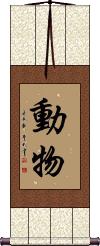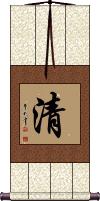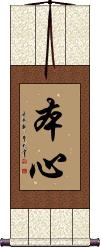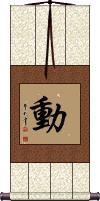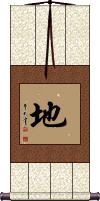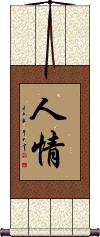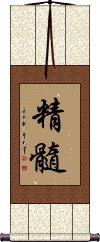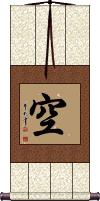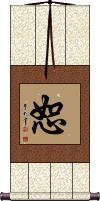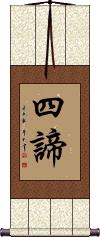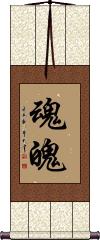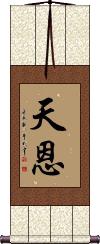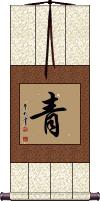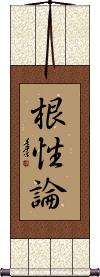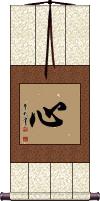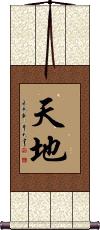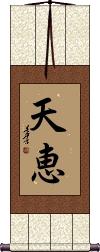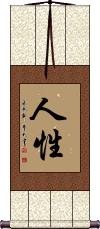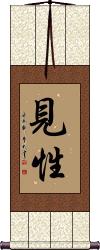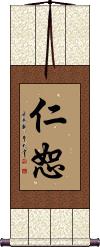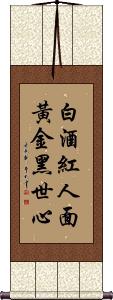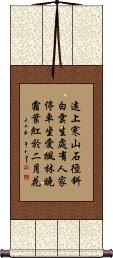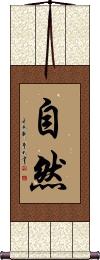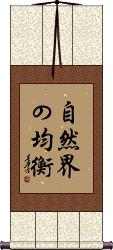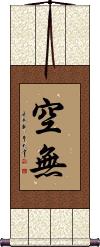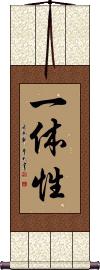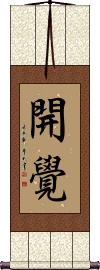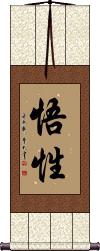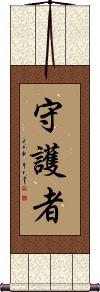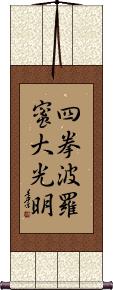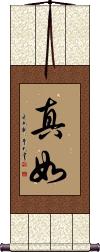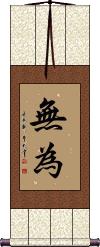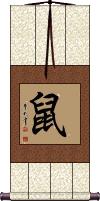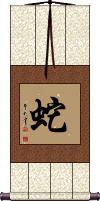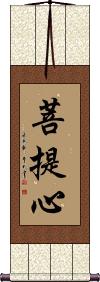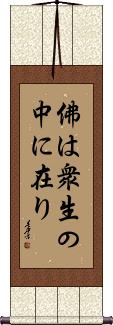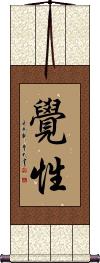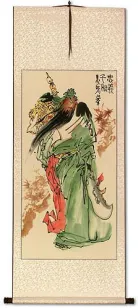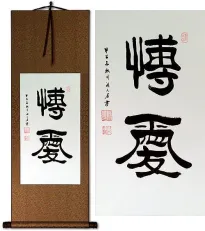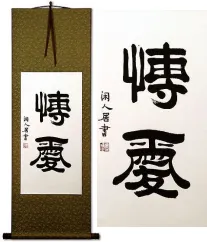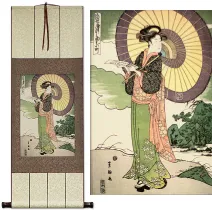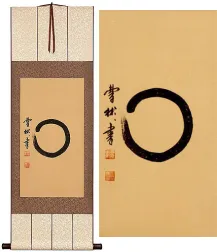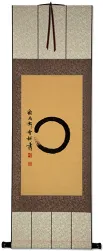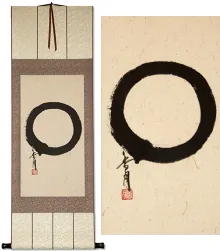Many custom options...
And formats...

The name Symbol for Nature in Chinese / Japanese...
Buy a Symbol for Nature calligraphy wall scroll here!
Personalize your custom “Symbol for Nature” project by clicking the button next to your favorite “Symbol for Nature” title below...
2. Animals
4. Seeing one’s Nature and becoming a Buddha
5. Clarity
7. The Spirit of Dragon and Tiger
8. Dynamic
9. Earth
11. Essence
12. Sky / Ether / Void / Emptiness / Unreality
13. Fire and Water Have No Mercy
14. Flexibility
15. Forgiveness
18. Grace from Heaven / Grace from God
19. Green
20. The Guts Theory
22. Heaven and Earth
24. Human Nature
25. Kensho - Initial Enlightenment
26. Kensho Jobutsu - Enlightenment - Path to Buddha
27. Ken Zen Ichi Nyo
28. Kindness and Forgiving Nature
29. Just as Liquor Turns a Face Red, Gold Turns a Heart Black
30. Energy Sword Body in Concert
31. Mother Nature
32. Mountain Travels Poem by Dumu
33. Nature
34. Nature in Balance / Balanced Nature
35. The Nature of Martial Arts
36. Nothingness
37. Oneness of Heaven and Humanity
38. Oneness / Unity
39. Open Mind
40. Power of Understanding and Wisdom
41. Protector
44. True Emptiness Yields Transcendent Existence
45. Soul Mates
46. Spirituality
47. Strong-Willed / Strong of Heart
48. Tathata / Ultimate Nature of All Things
49. Work Unselfishly for the Common Good
51. Rat / Mouse
52. Snake / Serpent
54. The Bodhi Mind
55. The Buddha is in Each Sentient Being
56. Self Awareness Becomes a Buddha
57. The Nature of Enlightenment in One's Mind
58. Born To Be Wild
60. Wind of Change
Animal Kingdom
動物王國 is literally what it says.
There is even a TV show in China that is similar to Wild Kingdom or what you would currently see on the Discovery Channel that has this same title.
For your information: In the Chinese way of thinking, the Tiger is the king of the animal kingdom (lions are not native to China, so the tiger took the role that we have given to the lion in our western way of thinking).
The modern Japanese version has a slight variation on the last character (国 instead of 國). Let me know if you want the modern Japanese version (國 would be considered the old or traditional version).
Animals
動物 is the way to write “animals” in Chinese characters, Japanese Kanji, and old Korean Hanja.
The first character means “moving,” and the second means “things.”
So animals are “moving things” in these Asian languages.
Beauty of Nature
Ka-Chou-Fuu-Getsu
花鳥風月 is the Japanese Kanji proverb for “Beauties of Nature.”
The dictionary definition is “the traditional themes of natural beauty in Japanese aesthetics.”
The Kanji each represents an element of nature that constitutes beauty in traditional Japanese art and culture.
The Kanji breakdown:
花 = ka = flower (also pronounced “hana”)
鳥 = chou = bird (also pronounced “tori”).
風 = fuu = wind (also pronounced “kaze”).
月 = getsu = moon (also pronounced “tsuki”)
Seeing one’s Nature and becoming a Buddha
見性成佛 is a universal phrase that suggests that one may see one's nature and accomplish Buddhahood.
見性 suggests penetrating deep inside oneself to see one's “Original finally
Mind.”
成佛 refers to a sentient being who dispenses with illusions and delusions
through ascetic practice, is enlightened to the truth, and becomes a Buddha.
This is used by Mahayana, Chan, and Zen Buddhists in China, Korea, and Japan.
You will also see this with the last character written as 仏 in Japanese. In the religious context, 佛 is commonly used to mean Buddha. If you want the other version, see Kenshō Jōbutsu 見性成仏
Clarity
清 is a word that means clarity or clear in Chinese, Japanese Kanji, and old Korean Hanja.
Looking at the parts of this character, you have three splashes of water on the left, “life” on the top right, and the moon on the lower right.
Because of something Confucius said about 2500 years ago, you can imagine that this character means “live life with clarity like bright moonlight piercing pure water.” The Confucian idea is something like “Keep clear what is pure in yourself, and let your pure nature show through.” Kind of like saying, “Don't pollute your mind or body, so that they remain clear.”
This might be stretching the definition of this single Chinese character but the elements are there, and “clarity” is a powerful idea.
Korean note: Korean pronunciation is given above but this character is written with a slight difference in the "moon radical" in Korean. However, anyone who can read Korean Hanja, will understand this character with no problem (this is considered an alternate form in Korean). If you want the more standard Korean Hanja form (which is an alternate form in Chinese), just let me know.
Japanese note: When reading in Japanese, this Kanji has additional meanings of pure, purify, or cleanse (sometimes to remove demons or "exorcise"). Used more in compound words in Japanese than as a stand-alone Kanji.
The Original Mind
In Zen Buddhism, 本心 means “original mind” or “original heart,” which refers to one's Buddha-nature present from birth.
This can also be translated as true feelings, real intention, one's own heart, one's right mind, one's senses, one's conscience, or fundamental mind.
Note: 心 can mean heart or mind - thought in ancient Asia to be the same organ.
The Spirit of Dragon and Tiger
龍虎精神 means the spirit of the dragon and tiger.
It speaks to the vitality and vigor that is the nature of these two creatures.
Beyond “spirit,” the last two characters can also mean mind, soul, or heart. Therefore, you can also say this means “Heart of the Dragon and Tiger,” etc.
龍虎精神 is often titled “Ryukoseishin” in many Japanese martial arts.
Dynamic
Moving / Motion / Ever-Changing
動 is the only Chinese/Japanese/Korean word that can encompass the idea of “dynamic” into one character.
動 can also mean:
to use; to act; to move; to change; motion; stir.
In the Buddhist context, it means: Movement arises from the nature of wind which is the cause of motion.
The key point of this word is that it represents motion or always moving. Some might say “lively” or certainly the opposite of something that is stagnant or dead.
Note: In Japanese, this can also be a female given name, Yurugi.
Earth
(Used in Japanese version of five elements)
地 is the single-character element and title of the planet Earth in Chinese, old Korean Hanja, and Japanese Kanji.
Because this is a single character, the definition is a little ambiguous and can have many meanings depending on the context in which it is used. These meanings include: earth, ground, land, soil, dirt, place, territory, bottom (of a package, book, etc.), earth (one of the Japanese five elements), the region in question, the local area, skin, texture, fabric, material, weave, base, background, one's true nature, narrative (i.e. descriptive part of a story), real life, actuality, etc.
In Japanese, this Kanji can be pronounced several ways, including chi, ji, tsushi, or tsuchi.
地 is also an element of the Japanese version of the five elements (the original Chinese version uses a different version of earth).
Empathy / Humanity
人情 is a title that can apply to a lot of meanings, including humanity, empathy, kindness, sympathy, human nature, human emotions, or human interaction.
Essence
精髓 is the Chinese, Japanese Kanji, and old Korean Hanja for essence.
This can also be translated as marrow, pith, quintessence, kernel, spirit, etc.
This often refers to the nature or basis of whatever element, plant, animal, being, person, or thing you are talking about.
The original Chinese version (also Korean Hanja) and modern Japanese version of the second character differ a tiny bit:
![]() vs.
vs. ![]()
Both versions are so close that both Chinese and Japanese people will recognize this word. If you want the specifically-Japanese version, click on this link instead of the button above: Order Essence in Japanese
Sky / Ether / Void / Emptiness / Unreality
(Used in Japanese version of five elements)
空 is a single character that means empty, void, hollow, vacant, vacuum, blank, nonexistent, vacuity, voidness, emptiness, non-existence, immateriality, unreality, the false or illusory nature of all existence, and being unreal.
In the Buddhist context, this relates to the doctrine that all phenomena and the ego have no reality but are composed of a certain number of skandhas or elements, which disintegrate. The void, the sky, space. The universal, the absolute, complete abstraction without relativity. The doctrine further explains that all things are compounds, or unstable organisms, possessing no self-essence, i.e. are dependent, or caused, come into existence only to perish. The underlying reality, the principle of eternal relativity, or non-infinity, i.e. śūnya, permeates all phenomena making possible their evolution.
From Sanskrit and/or Pali, this is the translation to Chinese and Japanese of the title śūnya or śūnyatā.
In Japanese, when pronounced as “ron” (sounds like “roan”) this can be a given name. It should be noted that this Kanji has about 5 different possible pronunciations in Japanese: kuu, kara, sora, ron, and uro. 空 is also an element in the Japanese version of the five elements.
Fire and Water Have No Mercy
Flexibility
靈活性 is a Chinese and Korean word that means flexibility or being open to change.
You consider others' ideas and feelings and don't insist on your own way. Flexibility gives you creative new ways to get things done. Flexibility helps you to keep changing for the better. 靈活性 could also be defined as having a “flexible nature.”
See Also: Cooperation
Forgiveness
恕 means to forgive, show mercy, absolve, or excuse in Chinese and Korean Hanja (though mostly used in compound words in Korean).
恕 incorporates the pictogram of a heart at the bottom, and a woman and a mouth at the top. The heart portion has the most significance, as it is suggested that it is the heart's nature to forgive.
In Asian culture, as with most other cultures, forgiveness is an act of benevolence and altruism. In forgiving, you put yourself in someone else's shoes and show them the kindness that you would want them to show you. Confucius referred to this quality as “human-heartedness.”
Four Noble Truths (Buddhism)
四諦 is the title of the Four Noble Truths as taught in virtually all sects of Buddhism.
These truths are suffering (dukkha), desire/attachment (samudaya), release from desire/attachment (nirodha), and the path leading away from suffering (magga).
The suggestion behind these truths is that all things in nature suffer. All things in nature have desire and attachment for things in the physical world. The enlightened can release themselves from the bonds of desire and attachment. And finally, once they release all desire and attachment, the enlightened will find a path that leads away from suffering.
This term is exclusively used by devout Buddhists. It is not a common term, and is remains an unknown concept to most Japanese, Chinese, and Korean people.
See Also: Buddhism | Enlightenment
Ghost / Soul / Spirit
魂魄 is a Chinese, Japanese Kanji, and old Korean Hanja term for ghost, soul, or spirit.
It's used in the context of Buddhism as:
Animus and anima; the spiritual nature or mind, and the animal soul; the two are defined as mind and body or mental and physical, the invisible soul inhabiting the visible body, the former being celestial, the latter terrestrial.
Grace from Heaven / Grace from God
天恩 is the deepest way to say “Heaven's Grace” or “God's Grace” in Chinese.
The first character means Heaven or sky (referring, in this case, to the domain of God).
The second character means grace, blessings, benevolence, favor/favour, acts of kindness, merits, or beneficial influence.
This title can also be defined as:
Blessings of Heaven, Favor of the Emperor, Divination's luckiest day, or blessings of nature. Note: When you see “Emperor” above, remember that the Emperor, like the Pope, is theoretically chosen by God or seen as an emissary or conduit of God in ancient Asian culture. It would only be read that way in a certain context, such as “The Emperor, in his mercy, bestowed upon him Heaven's Grace, and the prisoner was set free.”
Note: Technically, this is a Japanese word too (pronounced "ten-on") but it’s rarely used in Japan anymore. Therefore, this title is best if your audience is Chinese.
Green
The fresh green of nature
青 is nature's color and can refer to forest green, greenish-blue, or the darkest of greens.
青 and color represent nature, youth, and young people.
In the same way, we refer to green bananas and the rookie being green, the same is true in Chinese and Japanese, where, in a certain context, this can mean immature, unripe, or young.
In Japan, this can also be a female given name “Haru.” It can also be used as a given name (for either sex) in China.
The Guts Theory
The belief that where there's a will, there's a way.
根性論 is a Japanese title that refers to the belief that where there's a will, there's a way.
Another way to translate this is “The Guts Theory” or “The Doctrine of Will-Power.” Maybe breaking down the meaning of the characters will help clarify this:
根性 = will-power; guts; temper; nature; spirit; nature and character; the nature of the powers of any sense.
論 = theory; doctrine; treatises on dogma, philosophy, discipline, etc.
Heart / Mind / Spirit
心 would often be translated as “heart.”
However, because it was believed in Chinese culture for thousands of years that your consciousness and thoughts came from the big red organ in the middle of your chest, it also means “mind” or “spirit” and sometimes even “soul.”
In Korean, beyond heart, mind, and spirit, this character can mean moral, nature, mind, affections, intentions, core, and center. In fact, it is used in Chinese to mean “center” as well but only with another character in front of it. For instance, “medical center” or even “shopping center.” Separately and alone, it will not be read with that “center” meaning unless thought of as “the center of your soul.”
Heaven and Earth
天地 is “Heaven and Earth” in Chinese, Japanese Kanji, and old Korean Hanja.
This title is used in many different contexts. It can be a general term but is also used by Buddhists and in other religions.
This can also be used to refer to all of nature, the universe, the top and bottom, the realm of life, or the sphere of existence.
Blessed by Heaven
天恵 means “Heaven's Blessing,” “Blessings from Heaven,” or “Blessed by Heaven” in Japanese Kanji.
Depending on the context in which this is used, it can also mean “gift of nature,” or even “natural resources” (as in Heaven or God bestowed things like oil, iron, gold, and other natural resources upon mankind).
Human Nature
人性 is a title that is the essence of what it means to act and be human.
These two characters refer to the way we are as people.
人性 is also sometimes translated as human personality, human instinct, humanity, or humanism.
The first character literally means human or people.
The second character means nature. It can also mean property, quality, attribute, or essence. It can even be a modifier like “-ity” or “-ness,” which is why this word is also translated as “humanity.”
Kensho - Initial Enlightenment
見性 has the same meaning as Satori but refers to the initial state or initial experience of enlightenment.
This can also mean “self-discovery,” “self-awareness,” or “consciousness of one's character.”
In a very religious context, this means to behold the Buddha nature within oneself.
This term is exclusively used by devout Buddhists. It is not a common term, and is remains an unknown concept to most Japanese and Chinese people. Some Japanese people will dispute whether this title is valid in the Japanese language. Only order this if you are sure this title is right for you.
See Also: Buddhism | Enlightenment
Kensho Jobutsu - Enlightenment - Path to Buddha
見性成仏 or Kenshō Jōbutsu is the initial enlightenment that leads to self-awareness, becoming Buddha, and the path to enter Nirvana.
Kenshō Jōbutsu is a complex concept in Japanese Buddhism. 見性成仏 is probably better translated as “Seeing one’s nature and becoming a Buddha.”
See Also: Buddhism | Enlightenment | Initial Enlightenment
Ken Zen Ichi Nyo
拳禪一如 is a Japanese phrase that is often translated as “train both body and spirit.”
Here's the breakdown of the words in this phrase:
拳 means fist.
禅 is zen, which means meditation.
一如 is a word that means “to be just like,” “oneness,” “true nature,” or “true character.”
So to get to the translation of “train both body and spirit,” you must understand that “fist” is representing “body” and the idea of meditation is representing “mind.”
I have to say, this is not how I would translate this. To me, it's really about training with your mind and remembering that meditation is a huge part of training, not just your fist. As the Shaolin Buddhist monks show us, meditation is just as important as physical training in martial arts.
Kindness and Forgiving Nature
仁恕 is a word in Chinese and Japanese that means something like benevolence with magnanimity or kindness with a forgiving nature.
If this describes you, then you are the type of person that I would like to call my friend.
This may not be the most common word in daily use, but it's old enough that it transcended cultures from China to Japan in the 5th century when Japan lacked a written language and absorbed Chinese characters and words into their language.
Note: 仁恕 is not commonly used in Korean.
Just as Liquor Turns a Face Red, Gold Turns a Heart Black
白酒紅人面黃金黑世心 literally says: [Just as] white liquor makes people's faces turn red, [So] yellow gold makes people's hearts turn black.
This is a warning about the nature of greed. The suggestion is that one who lusts for gold and riches will eventually have a black heart (or become a heartless greedy bastard). As a wall scroll, this is a reminder and warning to keep yourself from following the greedy path.
Energy Sword Body in Concert
Spirit, Sword & Body as One
气剑体一致 often gets translated as “Mind Sword Body,” or “Spirit, Sword, and Body as One.” But I think these translations don't tell you enough about what this is really saying.
In this context, 気, which is the modern Japanese version of 氣, means spiritual and unseen energy or “life energy.” In some cases, 気 can be translated as spirit, feeling, or nature. If defined as the mind, it's more about the invisible or intangible parts of one's mind (or soul).
剣 is the Japanese version of 劍 meaning sword.
体 is the modern Japanese version of 體 meaning body.
The Kanji 一 means one, and in this case, suggests “all in one.”
The Kanji 到 means to send, deliver, or convey. But together, 一到 suggests all these things in agreement, union cooperation, or in concert.
Note: Arguments exist as to whether this should be romanized as Kikentaiitchi, Kikentaiicchi, or kikentaiichi. Technically, if you drop the last character, you get 気剣体一 and kikentaiichi (ki ken tai ichi), which is also a valid phrase.
Mother Nature
大自然 is the simple way to express “mother nature” in Chinese, Japanese Kanji, and old Korean Hanja.
This can also be translated as “the great nature” or “all of nature.”
Mountain Travels Poem by Dumu
This poem was written almost 1200 years ago during the Tang dynasty.
It depicts traveling up a place known as Cold Mountain, where some hearty people have built their homes. The traveler is overwhelmed by the beauty of the turning leaves of the maple forest that surrounds him just as night overtakes the day, and darkness prevails. His heart implores him to stop, and take in all of the beauty around him.
First, before you get to the full translation, I must tell you that Chinese poetry is a lot different than what we have in the west. Chinese words simply don't rhyme in the same way that English or other western languages do. Chinese poetry depends on rhythm and a certain beat of repeated numbers of characters.
I have done my best to translate this poem keeping a certain feel of the original poet. But some of the original beauty of the poem in its original Chinese will be lost in translation.
Far away on Cold Mountain, a stone path leads upwards.
Among white clouds, people's homes reside.
Stopping my carriage I must, as to admire the maple forest at nights fall.
In awe of autumn leaves showing more red than even flowers of early spring.
Hopefully, this poem will remind you to stop, and “take it all in” as you travel through life.
The poet's name is “Du Mu” in Chinese that is: ![]()
![]() .
.
The title of the poem, “Mountain Travels” is: ![]()
![]()
You can have the title, poet's name, and even “Tang Dynasty” written as an inscription on your custom wall scroll if you like.
More about the poet:
Dumu lived from 803-852 AD and was a leading Chinese poet during the later part of the Tang dynasty.
He was born in Chang'an, a city in central China and the former capital of the ancient Chinese empire in 221-206 BC. In present-day China, his birthplace is currently known as Xi'an, the home of the Terracotta Soldiers.
He was awarded his Jinshi degree (an exam administered by the emperor's court which leads to becoming an official of the court) at the age of 25 and went on to hold many official positions over the years. However, he never achieved a high rank, apparently because of some disputes between various factions, and his family's criticism of the government. His last post in the court was his appointment to the office of Secretariat Drafter.
During his life, he wrote scores of narrative poems, as well as a commentary on the Art of War and many letters of advice to high officials.
His poems were often very realistic and often depicted everyday life. He wrote poems about everything, from drinking beer in a tavern to weepy poems about lost love.
The thing that strikes you most is the fact even after 1200 years, not much has changed about the beauty of nature, toils, and troubles of love and beer drinking.
Nature
The natural world
自然 is the simple way to express nature in Chinese, Japanese Kanji, and old Korean Hanja.
This can also be translated as “the natural world.”
In Japanese and Korean, this term is sometimes used to signify spontaneity or a spontaneous act.
In the context of Taoism or Daoism, this is a key concept that literally means “of its own” or “by itself” and thus naturally, natural, spontaneously, freely, or in the course of events.
Also known as known as ziran or tzu-jan
Nature in Balance / Balanced Nature
Nature in Balance / Balanced Nature
生態平衡 is a title about the way and balance of nature.
The first two characters mean nature or the way of life.
The second two characters mean balance or balanced.
Note: We have two versions of this title on our website. This is the one we recommend, as it is a little more natural (no pun intended).
Nature in Balance / Balanced Nature
自然界の均衡 is a verbose way to say “nature in balance” in Japanese.
The first three Kanji have the meaning of “the natural world” or “the natural kingdom” (kind of like the animal kingdom but including plants and all things biological).
The third character is a Hiragana that acts to connect the two ideas here.
The last two Kanji mean equilibrium or balance.
Nature in Balance / Balanced Nature
The Nature of Martial Arts
Nothingness
空無 is “nothingness” in a Buddhist context.
The first character means empty but can also mean air or sky (air and sky have no form).
The second character means have not, no, none, not, or to lack.
Together these characters reinforce each other into a word that means “absolute nothingness.”
I know this is a term used in Buddhism, but I have not yet figured out the context in which it is used. I suppose it can be the fact that Buddhists believe that the world is a non-real illusion, or perhaps it's about visualizing yourself as “nothing” and therefore leaving behind your desire and worldliness.
Buddhist concepts and titles often have this element of ambiguity or, rather, “mystery.” Therefore, such ideas can have different meanings to different people, and that's okay. If you don't get it right in this lifetime, there will be plenty more lifetimes to master it (whatever “it” is, and if “it” really exists at all).
Soothill defines this as “Unreality, or immateriality, of things, which is defined as nothing existing of independent or self-contained nature.”
Oneness of Heaven and Humanity
天人合一 is a title that represents the oneness of heaven and humanity. It conveys the idea that man is an integral part of nature.
You can also read this as “heaven and man in unity,” or “nature and man in unity.” The “man” is really “people” or “humans” and is not gender-specific in Chinese.
Oneness / Unity
This title represents the idea of oneness, unity, integrity, and/or inclusion in Japanese.
The Kanji breakdown:
一 One 体 Body 性 Nature
Note: This word can be understood in Chinese but it more a Japanese word. Best if your audience is Japanese.
Open Mind
Power of Understanding and Wisdom
悟性 means the power of understanding and insight in Chinese.
It is often associated with Neo-Confucianism. In that regard, it means to realize, perceive, or have the perception of man's true nature. It can also mean finding your soul, the soul of others, or the soul of the world. Some will translate this simply as the state of being “savvy.”
In Japanese, this is often translated as wisdom and understanding.
Protector
守護者 is a Chinese, Japanese Kanji, and old Korean Hanja title for a protector, watcher, or keeper.
The character breakdown:
守護 = to guard; to protect; protection; safeguard.
者 = person; someone of that nature; someone doing that work, the one [who, which].
From this breakdown, you can translate this as “The one who protects,” “Someone who safeguards,” or “guardian.”
Reiki - Master Symbol
大光明 is the master symbol “Daikomyo” or “Dai Ko Myo,” which is usually associated with the healing practice of Reiki.
This title can be translated as “Great Bright Light.” This symbol, as used in Reiki, alludes to “Enlightened Nature” or the radiance of a purified soul or deity.
Pronunciations in Chinese and Korean are included above but this title has no meaning except when used by a Reiki practitioner. In fact, this title is not that well known by those outside the Reiki community in Japan.
In Chinese, this would be interpreted as “Great Bright Future” (the second two characters alone create a word that means “bright future” in Chinese).
Shiken Haramitsu Daikomyo
四拳波羅蜜大光明 is “shiken haramitsu daikōmyō,” a famous Japanese Buddhist mantra.
四拳 = shi-ken = four fists (many translate this as “four hearts”).
波羅蜜 = ha-ra-mitsu = A loanword representing pāramitā, or entrance into Nirvana. Awkwardly, it also means jackfruit.
大光明 = dai-kou-myo = big/great light bright (great bright light).
Shiken represents four hearts:
1. The Merciful Heart - Love and caring for all living things.
2. The Sincere Heart - Pursues righteousness, or the right path - sincerely trying to do what is right.
3. The Attuned Heart - Knows that nature and fate have their ways, and thus stay in tune with the universe.
4. The Dedicated Heart - Steadfast on the chosen path to the end.
True Emptiness Yields Transcendent Existence
According to Soothill 眞空妙有 means:
The true void is the mysteriously existing, truly void, or immaterial, yet transcendentally existing.
眞空妙有 is the state of being nonexistent after removing all errant worldly influences. 眞空妙有 is achieved when all forms of existence are seen for their real nature.
Soul Mates
It was tough to find the best way to say “soul mates” in Chinese. We settled on 天生一對 as an old way to say, “A couple selected by heaven.”
The first two characters together mean “natural” or “innate.” Separated, they mean “heaven” and “born.” The last two characters mean “couple.” So this can be translated as “A couple that is together by nature,” or “A couple brought together by heaven's decree.” With a slight stretch, you could say, “A couple born together from heaven.”
It's a struggle to find the best way to describe this idea in English but trust me, it is pretty cool, and it is a great way to say “soulmates.”
If you're in a happy relationship or marriage and think you have found your soul mate, this would be a wonderful wall scroll to hang in your home.
Spirituality
Strong-Willed / Strong of Heart
気の強い means strong-willed or strong of heart in Japanese.
Here's the character breakdown of this Japanese title:
気 (ki) spirit; mind; heart; nature; motivation; intention; feelings; essence.
の (no) possessive particle.
強い (tsuyoi) strong; powerful; mighty; potent; resistant; resilient; durable.
Note: Because this selection contains some special Japanese Hiragana characters, it should be written by a Japanese calligrapher.
Tathata / Ultimate Nature of All Things
真如 comes from the Sanskrit and Pali word often romanized as “tathata” or “tathatā.” Originally written, “तथता.”
It's a Buddhist term often translated as “thusness” or “suchness,” but this does not explain it.
A better explanation may be “the ultimate nature of all things” or “ultimate truth.” However, this gives it too strong of a feeling. This concept is sometimes described as being in awe of the simple nature of something - like a blade of grass blowing in the wind or ripples on water. It is what it is supposed to be, these things follow their nature. Amazing in their mundane simplicity.
Every sect of Buddhism will have a slightly different flavor or explanation, so don't get fixated on one definition.
Notes: Sometimes Buddhists use the word dharmatā, a synonym to tathatā.
In Japan, this can also be the female given name Mayuki, or the surname Majo.
Work Unselfishly for the Common Good
克己奉公 is a Chinese proverb that is often used to express how one should act as a government official. Most of us wish our public officials would hold themselves to higher standards. I wish I could send this scroll, along with the meaning to every member of Congress, and the President (or if I was from the UK, all the members of Parliament, and the PM)
This can also mean: “Place Strict Standards on Oneself in Public Service.”
The story behind this ancient Chinese idiom:
Cai Zun was born in China a little over 2000 years ago. In 24 AD, he joined an uprising led by Liu Xiu, who later became the emperor of the Eastern Han Dynasty.
Later, the new emperor put Cai Zun in charge of the military court. Cai Zun exercised his power in strict accordance with military law, regardless of the offender's rank or background. He even ordered the execution of one of the emperor's close servants after the servant committed a serious crime.
Cai Zun led a simple life but put great demands on himself to do all things honorably. The emperor rewarded him for his honest character and honorable nature by promoting him to the rank of General and granting him the title of Marquis.
Whenever Cai Zun would receive an award, he would give credit to his men and share the reward with them.
Cai Zun was always praised by historians who found many examples of his selfless acts that served the public interest.
Sometime long ago in history, people began to refer to Cai Zun as “ke ji feng gong.”
See Also: Unselfish | Selflessness | Altruism
Wu Wei / Without Action
Daoist / Taoist Tenet
無為 or “Wu Wei” is a Daoist (Taoist) tenet that speaks to the idea of letting nature take its course.
Some will say it's about knowing when to take action and when not to. In reality, it's more about not going against the flow. What will happen is controlled by the Dao (Tao), for which one who follows the Dao will not resist or struggle against.
There is a lot more to this concept, but chances are, if you are looking for this entry, you already know the expanded concept.
Warning: Outside of the Daoist context, this means idleness or inactivity (especially in Japanese, where not everyone knows this as a Daoist concept).
Rat / Mouse
Year of the Rat / Zodiac Sign
鼠 is the character for rat (and sometimes mouse) in Chinese, old Korean, and Japanese.
If you were born in the year of the Rat, you . . .
Are sensitive and smart.
Easily adapting to new environments.
Have a curious nature.
Are good at using the opportunities that are presented to you.
In some contexts, this character could mean “mouse.”
See also our Chinese Zodiac page.
Snake / Serpent
Year of the Snake / Zodiac Sign
蛇 is the character for snake or serpent in Chinese, old Korean, and Japanese.
If you were born in the year of the snake, you . . .
Are calm.
Are an inspiration to others.
Have a stubborn nature like a mule (you do not like to concede).
See also our Chinese Zodiac page.
Hon Sha Ze Sho Nen
The Bodhi Mind
菩提心 means Bodhi-mind or Bodhi-heart.
This title represents the will to realize supreme enlightenment. The awakening of the Bodhi-mind is of utmost importance in Buddhist training.
Other definitions include the mind for or of bodhi, the awakened, enlightened mind, or having Buddha-nature.
The Buddha is in Each Sentient Being
佛は衆生の中に在り is “Butsu wa shujo no naka ni ari” and means that the Buddha (potential for Buddhahood) exists in all beings in the universe.
So yes, your dog has the potential to be a Buddha (but only in a future reincarnation as a human). But all things, from the tiny cricket to the humpback whale have Buddha nature within them. If one takes the time to look and contemplate, one will see the Buddha in all things.
In Japan, sometimes the Buddha character is written 仏 instead of 佛, so you might see the whole phrase written as 仏は衆生の中に在り.
Note: Because this selection contains some special Japanese Hiragana characters, it should be written by a Japanese calligrapher.
Self Awareness Becomes a Buddha
自性覚れば即ち是れ佛なり is a Zen quote that means “If one realizes one's own nature, one becomes a Buddha.”
The inference here is that if you understand who you really are, and become truly aware of yourself and your original nature, you are well on your way to becoming a liberated person (a Buddha).
Note: Because this selection contains some special Japanese Hiragana characters, it should be written by a Japanese calligrapher.
The Nature of Enlightenment in One's Mind
Born To Be Wild
天生狂野 is “Born To Be Wild” (like the Steppenwolf song) in Chinese (Mandarin).
If you get to the deep meaning, the first two characters can mean “born” but refer as much to the nature, disposition, calling, or innate qualities of something or someone.
The last two mean coarse and/or wild.
So it kind of means that it is your nature to be wild.
Life is a Dew Drop
人生朝露 is a proverb that means “human life is like morning dew.”
Figuratively, this suggests the ephemeral and precarious nature of human existence.
Also translated as:
Man's life vanishes like a drop of dew.
A person's life is as fleeting as morning dew.
Life is as transient as morning due.
Wind of Change
風雲變幻 is a Chinese proverb that means “wind of change” or “changeable situation.”
The first character, 風, means wind, but when combined with the second character, 風雲, you have weather, winds and clouds, nature, or the elements. Colloquially, this can refer to an unstable situation or state of affairs.
The last two characters, 變幻, mean change or fluctuate.
This in-stock artwork might be what you are looking for, and ships right away...
Gallery Price: $200.00
Your Price: $88.88
Gallery Price: $200.00
Your Price: $69.88
Gallery Price: $200.00
Your Price: $69.88
Gallery Price: $108.00
Your Price: $59.88
Gallery Price: $61.00
Your Price: $33.88
Gallery Price: $60.00
Your Price: $36.88
Gallery Price: $60.00
Your Price: $36.88
Gallery Price: $60.00
Your Price: $36.88
Gallery Price: $90.00
Your Price: $49.88
The following table may be helpful for those studying Chinese or Japanese...
| Title | Characters | Romaji (Romanized Japanese) | Various forms of Romanized Chinese | |
| Animal Kingdom | 動物王國 动物王国 | doubutsu oukoku doubutsuoukoku dobutsu okoku | dòng wù wáng guó dong4 wu4 wang2 guo2 dong wu wang guo dongwuwangguo | tung wu wang kuo tungwuwangkuo |
| Animals | 動物 动物 | doubutsu / dobutsu | dòng wù / dong4 wu4 / dong wu / dongwu | tung wu / tungwu |
| Beauty of Nature | 花鳥風月 | ka chou fuu getsu kachoufuugetsu ka cho fu getsu | ||
| Seeing one’s Nature and becoming a Buddha | 見性成佛 见性成佛 | ken shou jou butsu kenshoujoubutsu ken sho jo butsu | jiàn xìng chéng fó jian4 xing4 cheng2 fo2 jian xing cheng fo jianxingchengfo | chien hsing ch`eng fo chienhsingchengfo chien hsing cheng fo |
| Clarity | 清 | sei | qīng / qing1 / qing | ch`ing / ching |
| The Original Mind | 本心 | hon shin / honshin | běn xīn / ben3 xin1 / ben xin / benxin | pen hsin / penhsin |
| The Spirit of Dragon and Tiger | 龍虎精神 龙虎精神 | ryu ko sei shin ryukoseishin | lóng hǔ jīng shén long2 hu3 jing1 shen2 long hu jing shen longhujingshen | lung hu ching shen lunghuchingshen |
| Dynamic | 動 动 | dou / do | dòng / dong4 / dong | tung |
| Earth | 地 | chi / ji / tsushi / tsuchi | dì / di4 / di | ti |
| Empathy Humanity | 人情 | ninjou / ninjo | rén qíng / ren2 qing2 / ren qing / renqing | jen ch`ing / jenching / jen ching |
| Essence | 精髓 / 精髄 精髓 | sei zui / seizui | jīng suǐ / jing1 sui3 / jing sui / jingsui | ching sui / chingsui |
| Sky Ether Void Emptiness Unreality | 空 | kuu / kara / sora / ron ku / kara / sora / ron | kōng / kong1 / kong | k`ung / kung |
| Fire and Water Have No Mercy | 水火無情 水火无情 | shuǐ huǒ wú qíng shui3 huo3 wu2 qing2 shui huo wu qing shuihuowuqing | shui huo wu ch`ing shuihuowuching shui huo wu ching |
|
| Flexibility | 靈活性 灵活性 | líng huó xìng ling2 huo2 xing4 ling huo xing linghuoxing | ling huo hsing linghuohsing |
|
| Forgiveness | 恕 | shù / shu4 / shu | ||
| Four Noble Truths (Buddhism) | 四諦 四谛 | shitai | sì dì / si4 di4 / si di / sidi | ssu ti / ssuti |
| Ghost Soul Spirit | 魂魄 | kon paku / konpaku | hún pò / hun2 po4 / hun po / hunpo | hun p`o / hunpo / hun po |
| Grace from Heaven Grace from God | 天恩 | tiān ēn / tian1 en1 / tian en / tianen | t`ien en / tienen / tien en | |
| Green | 青 | ao | qīng / qing1 / qing | ch`ing / ching |
| The Guts Theory | 根性論 | kon jou ron konjouron kon jo ron | ||
| Heart Mind Spirit | 心 | kokoro | xīn / xin1 / xin | hsin |
| Heaven and Earth | 天地 | tenchi | tiān dì / tian1 di4 / tian di / tiandi | t`ien ti / tienti / tien ti |
| Blessed by Heaven | 天恵 | ten kei / tenkei | ||
| Human Nature | 人性 | rén xìng / ren2 xing4 / ren xing / renxing | jen hsing / jenhsing | |
| Kensho - Initial Enlightenment | 見性 见性 | ken shou / kenshou / ken sho | jiàn xìng jian4 xing4 jian xing jianxing | chien hsing chienhsing |
| Kensho Jobutsu - Enlightenment - Path to Buddha | 見性成佛 見性成仏 | ken shou jou butsu kenshoujoubutsu ken sho jo butsu | ||
| Ken Zen Ichi Nyo | 拳禪一如 拳禅一如 | ken zen ichi nyo kenzenichinyo | ||
| Kindness and Forgiving Nature | 仁恕 | jinjo | rén shù / ren2 shu4 / ren shu / renshu | jen shu / jenshu |
| Just as Liquor Turns a Face Red, Gold Turns a Heart Black | 白酒紅人面黃金黑世心 白酒红人面黄金黑世心 | bái jiǔ hóng rén miàn huáng jīn hēi shì xīn bai2 jiu3 hong2 ren2 mian4 huang2 jin1 hei1 shi4 xin1 bai jiu hong ren mian huang jin hei shi xin | pai chiu hung jen mien huang chin hei shih hsin | |
| Energy Sword Body in Concert | 気剣体一致 / 氣劍體一致 气剑体一致 | ki ken tai icchi kikentaiicchi ki ken tai ichi | ||
| Mother Nature | 大自然 | dai shi zen daishizen | dà zì rán da4 zi4 ran2 da zi ran daziran | ta tzu jan tatzujan |
| Mountain Travels Poem by Dumu | 遠上寒山石徑斜白雲生處有人家停車坐愛楓林晚霜葉紅於二月花 远上寒山石径斜白云生处有人家停车坐爱枫林晚霜叶红于二月花 | yuǎn shàng hán shān shí jìng xiá bái yún shēng chù yǒu rén jiā tíng chē zuò ài fēng lín wǎn shuàng yè hóng yú èr yuè huā yuan3 shang4 han2 shan1 shi2 jing4 xia2 bai2 yun2 sheng1 chu4 you3 ren2 jia1 ting2 che1 zuo4 ai4 feng1 lin2 wan3 shuang4 ye4 hong2 yu2 er4 yue4 hua1 yuan shang han shan shi jing xia bai yun sheng chu you ren jia ting che zuo ai feng lin wan shuang ye hong yu er yue hua | yüan shang han shan shih ching hsia pai yün sheng ch`u yu jen chia t`ing ch`e tso ai feng lin wan shuang yeh hung yü erh yüeh hua yüan shang han shan shih ching hsia pai yün sheng chu yu jen chia ting che tso ai feng lin wan shuang yeh hung yü erh yüeh hua |
|
| Nature | 自然 | shi zen / shizen | zì rán / zi4 ran2 / zi ran / ziran | tzu jan / tzujan |
| Nature in Balance Balanced Nature | 自然平衡 | zì rán píng héng zi4 ran2 ping2 heng2 zi ran ping heng ziranpingheng | tzu jan p`ing heng tzujanpingheng tzu jan ping heng |
|
| Nature in Balance Balanced Nature | 生態平衡 生态平衡 | shēng tài píng héng sheng1 tai4 ping2 heng2 sheng tai ping heng shengtaipingheng | sheng t`ai p`ing heng shengtaipingheng sheng tai ping heng |
|
| Nature in Balance Balanced Nature | 自然界の均衡 | shizenkai no kinkou shizenkainokinkou shizenkai no kinko | ||
| Nature in Balance Balanced Nature | 自然の調和 | shizen no cho wa shizennochowa | ||
| The Nature of Martial Arts | 自然武道 | shi zen bu do shizenbudo | zì rán wǔ dào zi4 ran2 wu3 dao4 zi ran wu dao ziranwudao | tzu jan wu tao tzujanwutao |
| Nothingness | 空無 空无 | kuu mu / kuumu / ku mu | kōng wú / kong1 wu2 / kong wu / kongwu | k`ung wu / kungwu / kung wu |
| Oneness of Heaven and Humanity | 天人合一 | tiān rén hé yī tian1 ren2 he2 yi1 tian ren he yi tianrenheyi | t`ien jen ho i tienjenhoi tien jen ho i |
|
| Oneness Unity | 一體性 一体性 | ittaisei | yī tǐ xìng yi1 ti3 xing4 yi ti xing yitixing | i t`i hsing itihsing i ti hsing |
| Open Mind | 開覺 开觉 | kaikaku / kaikaku | kāi jué / kai1 jue2 / kai jue / kaijue | k`ai chüeh / kaichüeh / kai chüeh |
| Power of Understanding and Wisdom | 悟性 | gosei | wù xìng / wu4 xing4 / wu xing / wuxing | wu hsing / wuhsing |
| Protector | 守護者 守护者 | shu go sha / shugosha | shǒu hù zhě shou3 hu4 zhe3 shou hu zhe shouhuzhe | shou hu che shouhuche |
| Reiki - Master Symbol | 大光明 | dai kou myou daikoumyou dai ko myo | dà guāng míng da4 guang1 ming2 da guang ming daguangming | ta kuang ming takuangming |
| Shiken Haramitsu Daikomyo | 四拳波羅蜜大光明 | shi ken ha ra mitsu dai kou myou shi ken ha ra mitsu dai ko myo | ||
| True Emptiness Yields Transcendent Existence | 眞空妙有 | shin kuu myou u shinkuumyouu shin ku myo u | zhēn kōng miào yǒu zhen1 kong1 miao4 you3 zhen kong miao you zhenkongmiaoyou | chen k`ung miao yu chenkungmiaoyu chen kung miao yu |
| Soul Mates | 天生一對 天生一对 | tiān shēng yí duì tian1 sheng1 yi2 dui4 tian sheng yi dui tianshengyidui | t`ien sheng i tui tienshengitui tien sheng i tui |
|
| Spirituality | 精神性 | seishinsei / seshinse | jīng shén xìng jing1 shen2 xing4 jing shen xing jingshenxing | ching shen hsing chingshenhsing |
| Strong-Willed Strong of Heart | 氣の強い 気の強い | ki no tsuyo i kinotsuyoi | ||
| Tathata Ultimate Nature of All Things | 真如 | shinnyo | zhēn rú / zhen1 ru2 / zhen ru / zhenru | chen ju / chenju |
| Work Unselfishly for the Common Good | 克己奉公 | kè jǐ fèng gōng ke4 ji3 feng4 gong1 ke ji feng gong kejifenggong | k`o chi feng kung kochifengkung ko chi feng kung |
|
| Wu Wei Without Action | 無為 无为 | mui | wú wéi / wu2 wei2 / wu wei / wuwei | |
| Rat Mouse | 鼠 | nezumi | shǔ / shu3 / shu | |
| Snake Serpent | 蛇 | hebi | shé / she2 / she | |
| Hon Sha Ze Sho Nen | 本者是正念 | hon sha ze shou nen honshazeshounen hon sha ze sho nen | ||
| The Bodhi Mind | 菩提心 | bo dai shin bodaishin | pú tí xīn pu2 ti2 xin1 pu ti xin putixin | p`u t`i hsin putihsin pu ti hsin |
| The Buddha is in Each Sentient Being | 佛は衆生の中に在り | butsu wa shujou no naka ni ari butsuwashujounonakaniari butsu wa shujo no naka ni ari | ||
| Self Awareness Becomes a Buddha | 自性覚れば即ち是れ佛なり | Jishou satore ba sunawachi kore butsu nari Jisho satore ba sunawachi kore butsu nari | ||
| The Nature of Enlightenment in One's Mind | 覺性 觉性 | kakushou / kakusho | jué xìng / jue2 xing4 / jue xing / juexing | chüeh hsing / chüehhsing |
| Born To Be Wild | 天生狂野 | tiān shēng kuáng yě tian1 sheng1 kuang2 ye3 tian sheng kuang ye tianshengkuangye | t`ien sheng k`uang yeh tienshengkuangyeh tien sheng kuang yeh |
|
| Life is a Dew Drop | 人生朝露 | jin sei chou ro jinseichouro jin sei cho ro | rén shēng zhāo lù ren2 sheng1 zhao1 lu4 ren sheng zhao lu renshengzhaolu | jen sheng chao lu jenshengchaolu |
| Wind of Change | 風雲變幻 风云变幻 | fēng yún biàn huàn feng1 yun2 bian4 huan4 feng yun bian huan fengyunbianhuan | feng yün pien huan fengyünpienhuan |
|
| In some entries above you will see that characters have different versions above and below a line. In these cases, the characters above the line are Traditional Chinese, while the ones below are Simplified Chinese. | ||||
Successful Chinese Character and Japanese Kanji calligraphy searches within the last few hours...

